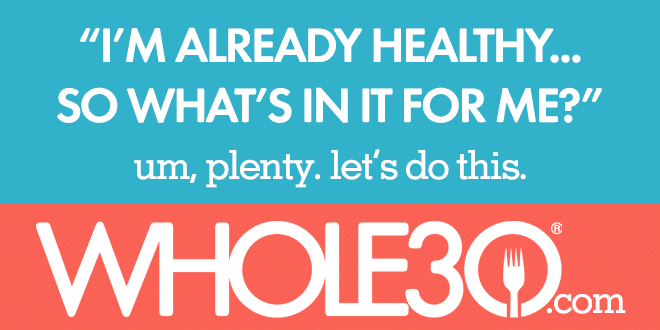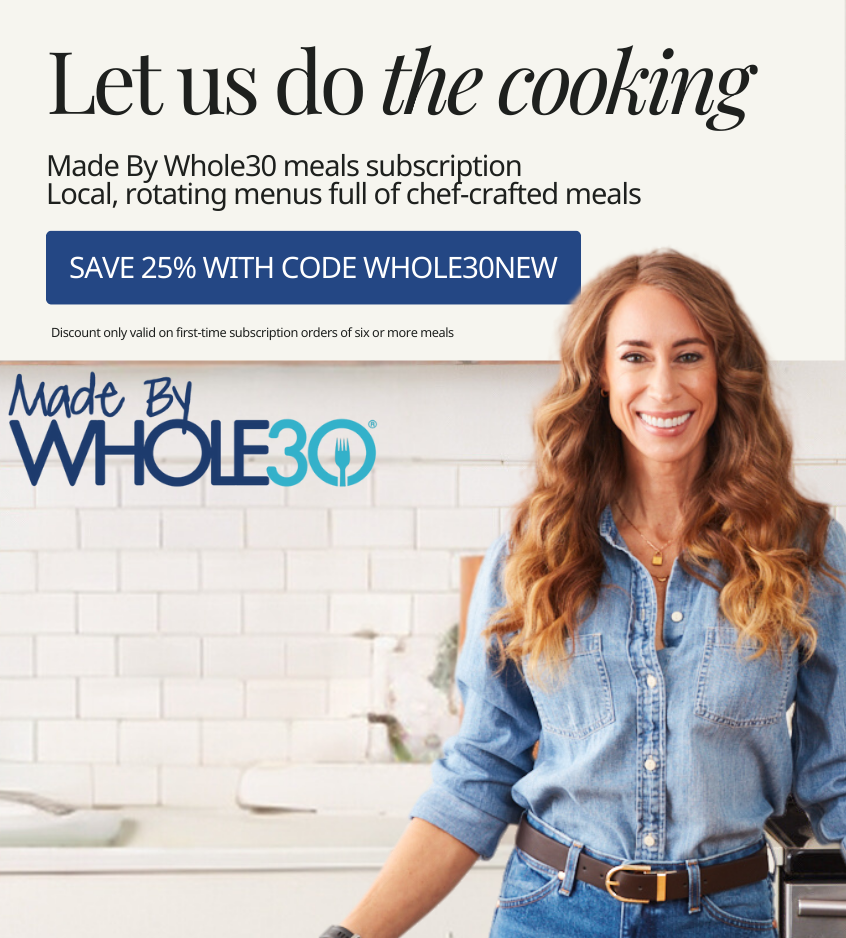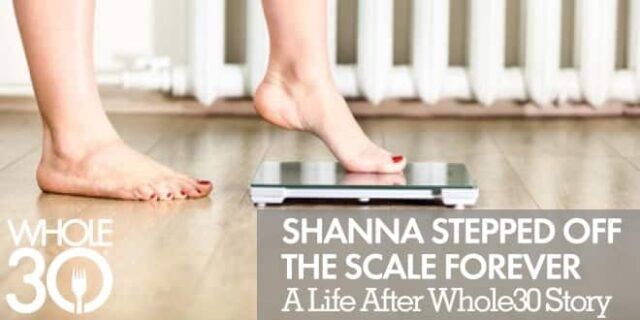We recently received a Twitter question that caught our attention. It was simple and to the point, and it went like this: “My greatest curiosity of how my #Whole30 experience may unfold: I have no known problems, so what improvements might be in store?” (@aaronadel) This is a pretty common sentiment, especially from people who aren’t overweight. (No, the Whole30 is not a weight loss plan, but that’s still a common misconception.) Yet in many of our media interviews, we’ve stated that everyone could benefit from the Whole30; not just those who are sick or overweight. So, to answer Aaron’s question, what’s in it for YOU: someone who is generally healthy, with a good body composition, and no known medical issues? Potentially, a whole heck of a lot.
The Fix For Stuff You Didn’t Even Know You Had
First, we’re going to seriously question the idea that you don’t have any problems at all. See, almost all of us have stuff—we just aren’t very aware of it, because our stuff is with us all the time, so it just becomes our norm. A prime example of this is digestive issues. People walk around after some (or most) meals with some degree of bloating, gas, cramping, irregularity, heartburn, or acid reflux. This happens day in and day out, to the degree that it becomes invisible; it’s just what happens when you eat. This is common, but not normal. And until you experience what a few weeks of meals without these side effects feels like, you probably don’t even realize that these “side effects” are making you feel less than awesome. Other common-but-not-normal health conditions that you may not even notice any more include acne, rashes, or other skin conditions; headaches or migraines; allergies or sinus issues; chronic pain (back pain, shoulder pain, tendonitis); hypoglycemia or poor blood sugar control; or uncontrollable cravings/feeling out of control with your food. (Not to mention the stuff going on under the hood—blood pressure creeping up, triglycerides bordering on “high,” or inflammatory markers slowly rising.) For these people, the Whole30 health reset provides benefits they weren’t even looking for—but once you experience life without these issues, you can’t imagine ever going back to what used to pass for normal for you.
A General Life Upgrade (You 2.0)
Even if you don’t have medical issues or symptoms, the Whole30 still provides incredible benefits in areas of your life integral for health, happiness, and quality of life. (And again, you may not even realize these factors could be even better than they already are!) Near universally, Whole30’ers report an improvement in energy levels. Many report waking up halfway through week two feeling like a switch has been flipped—that’s tiger blood, baby. Still others report waking without an alarm, feeling refreshed and alert, and no longer needing that pick-me-up (or a catnap) during the 3 PM afternoon hours. Just as frequently, they report sleep improves dramatically; people fall asleep faster, stay asleep longer, and sleep more restfully. These two benefits alone would be a game-changer in terms of your mood, focus, and overall productivity—but according to thousands of self-reported results, the Whole30 helps directly with those things too, plus provides a healthy dose of self-confidence and self-efficacy. (The act of completing the Whole30 alone is pretty badass—and that kind of confidence spills over into every other area of your life.) Plus, nearly everyone reports finishing the program with fewer (or no) cravings, feeling more in control of their food choices. So, maybe you don’t have any dramatic medical “cures” or symptom resolutions, but you wake up every morning feeling better than you have in decades, newly confident in your choices and recommitted to your health. Um, yeah, we’d call that a major Whole30 win.
Not Much, Until Reintroduction
Here’s another possibility: you don’t see the dramatic benefits of the Whole30 “reset” and self-experiment until it’s over. Maybe you get through your 30 days feeling marginally better, but not noticing any magical improvements… but then you start reintroducing some of your old favorites, and all of a sudden, things take a sharp turn. (And not in a good direction.) It’s possible that the benefits of the Whole30 will sneak up on you so gradually (especially if you’re starting off pretty healthy and eating a Paleo-style diet) that you don’t notice that you’re actually feeling better. But reintroduction brings that on home, helping you see very clearly and directly how the stuff you used to eat is actually impacting your health, cravings, and quality of life, and putting into sharp focus how much better you’ve actually been feeling the last 30 days. This information is some of the most valuable the program has to offer. Learning how potentially less healthy foods impact you individually is the key to creating a healthy, sustainable, life-long plan after your Whole30 is over. So as much as the awareness kind of sucks sometimes, isn’t it better to know that these foods have been having a sneaky, negative impact on you, and then make an educated, informed decision about including them in your diet going forward? Yes. It is. You’re welcome.
Nothing… But You’re Healthier
Finally, in the rare chance that you get through the Whole30 and nothing changes (which, honestly, happens so infrequently we cannot even remember the last time someone reported that absolutely nothing got better), here’s your worst-case scenario: You ate really healthy, whole, nutrient-dense food for 30 days, which is really good for every one of your body’s systems. So maybe you don’t experience the “magic” that most people report… but you discover joy in cooking, build your kitchen confidence, recalibrate your taste buds, try some new recipes, and discover a few new foods that you really enjoy. That’s the worst that can happen.* Doesn’t sound bad to us.
Just Try It Already
Here’s the thing: you’re not sure if the Whole30 will do anything for you… but the potential up-sides are numerous, and the potential down sides are virtually non-existent. So, try it. Give us 30 days and see what changes, what gets better, what you’ve learned, how the experience made you feel. You can do anything for a month, and this month has the potential to change your life in a profound and permanent way. We might be biased, but this sounds like a good trade-off to us.
*There are people with specific medical conditions or sensitivities/intolerances for whom the dramatic shift to Whole30 foods is actually not the best plan, and could prove harmful if not closely monitored or adjusted. (Type 1 diabetics or those with a history of eating disorders are good examples.) We always recommend working with your health care provider to implement the Whole30 in the way that’s best suited for your specific context.

















